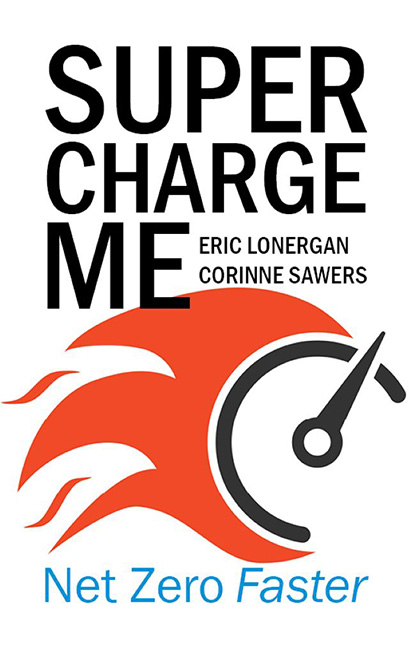Book contents
- Frontmatter
- Contents
- Acknowledgements
- Introduction: A Failure of the Mind
- 1 Supercharging: What is it?
- 2 Corporate Philosophers
- 3 Money Gets the Message
- 4 Supercharge the Individual
- 5 Supercharge the Nation
- 6 Supercharge the World
- 7 Why This is Not a Book About Trees
- Conclusion: Speaking With One Voice
- Notes
- Index
4 - Supercharge the Individual
Published online by Cambridge University Press: 20 January 2024
- Frontmatter
- Contents
- Acknowledgements
- Introduction: A Failure of the Mind
- 1 Supercharging: What is it?
- 2 Corporate Philosophers
- 3 Money Gets the Message
- 4 Supercharge the Individual
- 5 Supercharge the Nation
- 6 Supercharge the World
- 7 Why This is Not a Book About Trees
- Conclusion: Speaking With One Voice
- Notes
- Index
Summary
Corinne: The more you think about climate change, the more you start thinking that you need to change everything in your life. Even when I’m on my smartphone, I can't help thinking: How much energy was used to make this? How much fuel was consumed to mine the metals, or transport the components from China, California, Malaysia, Taiwan? How much energy is required to heat the Apple store? How much electricity is used to charge the battery? It is hardly surprising that many climate activists conclude that everything in our behaviour, habits and lifestyles needs to change. This also makes the challenge feel insurmountable. At the other extreme, the Canadian climate economist, Mark Jaccard, has written that the focus on the need for individual lifestyle change is a myth.
Eric: Individual lifestyle decisions are often a central element of “solutions” in climate campaigns. This approach often reads more like a wish-list than a focused strategy for social change. The real challenge is delivering a huge global investment drive to make electricity sustainable and electrify all energy use. The implicit view of psychology is also naive. Changing behaviour is not as simple as responding to ethical arguments and lists in books. And yet, as we mentioned in Chapter 1, there are some important areas where we may not be able to rely on either investment or new technology, and we do need to change behaviour. In which case we need a realistic understanding of social change and behavioural psychology.
Corinne: The typical to-do list says “eat less meat”, “car share” and “consume less”. On the fuzzy end of the spectrum, we’re advised to practice mindfulness, plant trees, and work to find our purpose. There's something fundamentally unhelpful about much of this, which is worth being blunt about. Even the engaged, informed and the motivated don't change their behaviours like this. I have a guilty history of susceptibility to fast fashion. I have to fight the thrill of filling a digital basket with cheap fashion goodies, the big bag arriving, and new outfits galore. You get a serotonin hit from it. Marketing strategies play on the precise psychological traits that Dan Ariely describes. I’ve managed to quit fast fashion now, but I still struggle to wean myself off the odd burger. The recommendations in books like How To Avoid A Climate Disaster, or The Future We Choose, are spot on.
- Type
- Chapter
- Information
- Supercharge MeNet Zero Faster, pp. 81 - 100Publisher: Agenda PublishingPrint publication year: 2022



